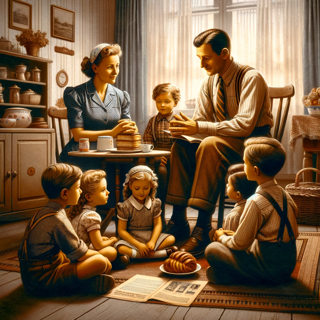January 2024
Discover the profound lessons of acceptance and diversity in The Electrician and the Seamstress, a riveting narrative that delves into the experiences of Bruno and Karla, who navigated the tumultuous era of World War II. This article illuminates their unwavering principles of kindness and open-mindedness, passed down through generations. It compellingly explores how these values influenced their family's stance against the Nazis, their advocacy for diverse friendships, and their courage to confront societal prejudices. Join us on a journey that transcends time, offering a poignant reminder of the enduring power of character and the importance of scrutinizing leaders, a message as relevant today as it was in the past
Last updated 20 months ago
Will publish on 06/07/2026
Lessons from Bruno and Karla
By Monica Granlove
My mother, Bruno and Karla’s daughter, gave many interviews for the book The Electrician and The Seamstress. During those interviews there were a couple of recurring themes which her parents taught her, lessons handed down generation after generation.
The initial lesson underscored my grandparents' perspective on the Nazis, probing the question of how individuals could rally behind a regime founded on fear and hatred. The aftermath of World War I, coupled with an unstable government, unleashed hyperinflation, widespread job losses, and overall chaos, providing fertile ground for Hitler's ascent to power. His charismatic appeal and promises of hope struck a chord with a desperate populace. When his true intentions were unveiled, fear quelled dissent, serving as a cautionary tale that transcends borders.
This narrative extends beyond historical contexts; it's a universal reminder that people, driven by the quest for hope, can sometimes unwittingly allow politicians to exploit their fears. Particularly pertinent in the United States, it serves as a call to thoroughly scrutinize politicians before casting votes, acknowledging the potential consequences of placing trust in charismatic figures without due diligence.
The second lesson revolved around the principles of acceptance and the celebration of diversity. My grandparents championed the idea of accepting individuals based on the kindness they exhibit, regardless of factors like skin color, religion, sexual preference, or political views. Despite never having met Bruno and Karla, their great-grandchildren absorbed this lesson, fostering a wide array of diverse friendships. As adults, they perpetuate this ethos, valuing differences and prioritizing mutual respect and kindness. The essence of these lessons mirrors Bruno and Karla's philosophy, where authentic character stood out as the most significant factor.
Bruno and Karla firmly believed that disagreement is a natural part of life, as long as it is accompanied by mutual respect and kindness. This principle underscored the importance of fostering healthy discussions, where differing opinions are acknowledged and respected, reinforcing the idea that diversity of thought can coexist harmoniously when anchored in mutual courtesy and understanding.
Bruno and Karla, embodying a spirit of open-mindedness, strongly advocated for my mother's marriage to my father based on love, disregarding societal prejudices against marrying a Jew. Their focus was on the way my father treated my mother, transcending religious disparities. Conversely, some members of my father's family, akin to Eli's family in The Surgeon and the Soldier, exhibited discriminatory behavior rooted in socioeconomic and cultural differences. They rejected my mother based on her German heritage, despite her family's opposition to the Nazis, and never took the time to acquaint themselves with her as an individual.
However, as those who initially discriminated against her age, they underwent a transformative process. Opening their minds, they began to recognize her as a person of integrity and compassion. I personally participated in conversations where they expressed regret for how they had treated her in the past. This evolution serves as a powerful testament to the potential for personal growth and understanding, highlighting the capacity for positive change even in those who once held discriminatory beliefs.
A poignant anecdote recounts my mother's job relocation when I was seven. Our house was for sale, and we stayed with neighbors until the house sold and we could move. In our middle-class neighborhood, children played together until dusk, fostering an idyllic atmosphere. Parents looked out for each other's children, and close-knit relationships characterized the community. However, an incident revealed a neighbor's prejudiced beliefs. Upon learning a black family expressed interest in buying our house, the neighbor objected, expressing concern about property values. My mother, angered by this blatant racism, confronted the neighbor, highlighting the hypocrisy. She challenged the neighbor's bias, ultimately asserting that such prejudices had no place in her decisions. Forty-seven years later, my mother expressed her pride in my sister. My mother asked my twelve-year-old sister why she didn’t say they were black. My sister simply replied, “I didn’t think it mattered.”
The story reflects the enduring importance of standing against discrimination, even in the face of societal biases. My mother's response, as relayed by my sister, epitomizes a proud moment, showcasing a commitment to equality and a rejection of racial prejudice. This powerful narrative echoes the timeless lessons imparted by Bruno and Karla—a legacy of compassion, acceptance, and the unwavering belief that character transcends superficial differences.


